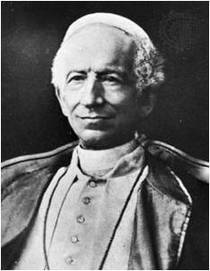 Pope Leo XIII
Pope Leo XIII By: Christ the King Law Center (CKLC)
Editor's Note: The following is a modified abstract of a paper presented at a conference held by Christ the King Law Center (CKLC) on October 8, 2016 titled Make America Catholic Again!
The Magisterium of the Church and good philosophy teaches that government in civil society has several legitimate forms. Pope Leo XIII in his Encyclical Diurturnum Illud taught the following: "There is no question here respecting forms of government, for there is no reason why the Church should not approve of the chief power being held by one man or by more, provided only it be just, and that it tend to the common advantage. Wherefore, so long as justice be respected, the people are not hindered from choosing for themselves that form of government which suits best either their own disposition, or the institutions and customs of their ancestors." [1]
Saint Thomas Aquinas reasoned that there are three classical forms of government that are legitimate and in harmony with natural order. They are: polity, aristocracy, and monarchy.
In a polity the government is controlled by many people. According to Thomas Aquinas a polity is a "just government... administered by many." [2] A polity could easily be compared by many to a modern day democracy but according to Thomas Aquinas a democracy was an unjust form of government in which "the bad government is carried on by the multitude." [3] A polity and democracy are both similar in that they are governments ruled by many but they are different in that in a polity the rulers seek the common good while in a democracy they seek their own good over the common good. Thus Aquinas reasons that "a government becomes unjust by the fact that the ruler, paying no heed to the common good, seeks his own private good. Wherefore the further he departs from the common good the more unjust will his government be." [4]
In an aristocracy the government is controlled by a few men of virtue. Aquinas states that this form of government is one of "noble governance, or governance by noble men.." (Ibid) By noble men Aquinas implies that they are not noble because they are born in the right family but noble because they are virtuous. [5] And just as Aquinas taught that democracy is the opposite of polity so he taught that the opposite of aristocracy was oligarchy where the government was ruled by a few who sought their own advantage over that of the common good. [6]
In a monarchy the government is controlled by one person. Aquinas states that "if a just government is in the hands of one man alone, he is properly called a king" and he compares such a king to King David who ruled ancient Israel by God's appointment. [7] And as with polity and aristocracy Aquinas taught that the opposite of monarchy is tyranny where one person seeks their own benefit and not the good of their subjects.
[1] Leo XIII, Encyclical Diuturnum (1881) 7.
[2] Aquinas, St. Thomas. On Kingship To the King of Cyprus, trans. Gerald B. Phelan. East Toronto, Ontario, Canada: Mediaeval Studies; 1949. Google book service. Web. 30 Nov. 2017.
[3] Ibid.
[4] Ibid.
[5] Ibid.
[6] Ibid.
[7] Ibid.
 RSS Feed
RSS Feed
